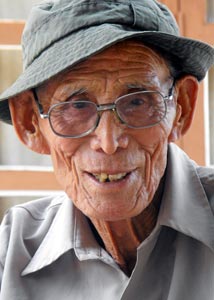Name: Dhondup
(Alias: No)
Gender: Male
Interview Age: 80
Date of Birth: 1930
Birthplace: Dhobi, Amdo, Tibet
Year Left Tibet: 1959
Profession: Monk
Monk/Nun: Previously
Political Prisoner: No

Interview No.: 36M
Date: 2010-04-10
Language: Tibetan
Location: Doeguling Settlement, Mundgod, Karnataka, India
Categories: Resistance and Revolution
Keywords: Amdo, army -- Tibetan, childhood memories, Chinese -- first appearance of, Chinese army -- invasion by , monastic life, Panchen Lama
Summary:
Dhondup became a monk at the young age of 7 at the Tashi Gomang Monastery in Amdo and does not remember much about his family since he left home so early. When he was 21 years old he travelled to Lhasa, journeying for three months and 21 days to join Drepung Monastery.
After three years in Drepung Monastery, Dhondup went to Tashi Lhunpo Monastery, the seat of His Holiness the Panchen Lama, on a pilgrimage. He decided to join this monastery as many monks of his village resided there. He recalls his life at the Tashi Lhunpo Monastery, seeing the the Panchen Lama and the presence of the Chinese in the region.
Dhondup vividly recalls his personal experience of the capture of the Khadhang Unit of the Tibetan Army, which served as the bodyguards of the Panchen Lama. He explains the role played by the Commander of the Unit, who acted as an informer for the Chinese and facilitated the capture. The Panchen Lama was taken away to China and Dhondup stayed in his monastery until June of 1959 when he escaped through Sikkim. He left the monkhood while working on road construction in Simla, Himachal Pradesh, India.
Interview Team:
- Rebecca Novick (Interviewer)
- Ronny Novick (Videographer)
- Namgyal Tsering (Interpreter)

